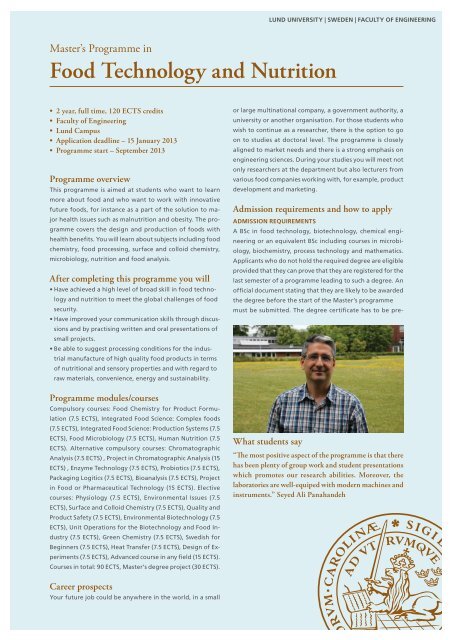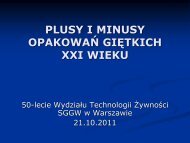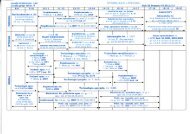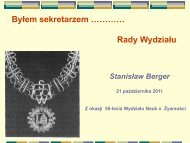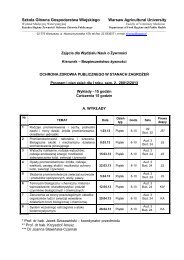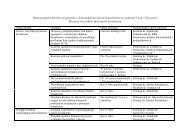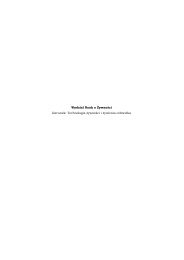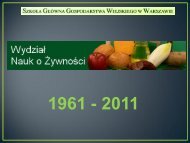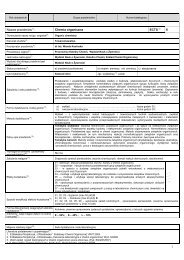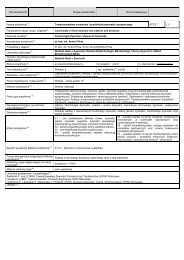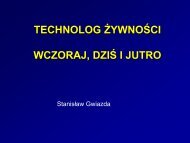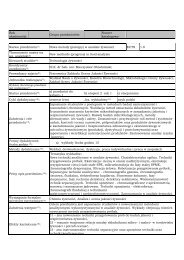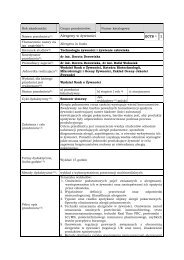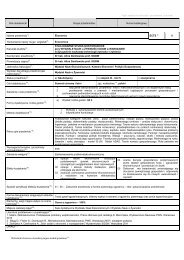Food Technology and Nutrition
Food Technology and Nutrition
Food Technology and Nutrition
Create successful ePaper yourself
Turn your PDF publications into a flip-book with our unique Google optimized e-Paper software.
Master’s Programme in<br />
<strong>Food</strong> <strong>Technology</strong> <strong>and</strong> <strong>Nutrition</strong><br />
• 2 year, full time, 120 ECTS credits<br />
• Faculty of Engineering<br />
• Lund Campus<br />
• Application deadline – 15 January 2013<br />
• Programme start – September 2013<br />
Programme overview<br />
This programme is aimed at students who want to learn<br />
more about food <strong>and</strong> who want to work with innovative<br />
future foods, for instance as a part of the solution to major<br />
health issues such as malnutrition <strong>and</strong> obesity. The programme<br />
covers the design <strong>and</strong> production of foods with<br />
health benefits. You will learn about subjects including food<br />
chemistry, food processing, surface <strong>and</strong> colloid chemistry,<br />
microbiology, nutrition <strong>and</strong> food analysis.<br />
After completing this programme you will<br />
• Have achieved a high level of broad skill in food technology<br />
<strong>and</strong> nutrition to meet the global challenges of food<br />
security.<br />
• Have improved your communication skills through discussions<br />
<strong>and</strong> by practising written <strong>and</strong> oral presentations of<br />
small projects.<br />
• Be able to suggest processing conditions for the industrial<br />
manufacture of high quality food products in terms<br />
of nutritional <strong>and</strong> sensory properties <strong>and</strong> with regard to<br />
raw materials, convenience, energy <strong>and</strong> sustainability.<br />
Programme modules/courses<br />
Compulsory courses: <strong>Food</strong> Chemistry for Product Formulation<br />
(7.5 ECTS), Integrated <strong>Food</strong> Science: Complex foods<br />
(7.5 ECTS), Integrated <strong>Food</strong> Science: Production Systems (7.5<br />
ECTS), <strong>Food</strong> Microbiology (7.5 ECTS), Human <strong>Nutrition</strong> (7.5<br />
ECTS). Alternative compulsory courses: Chromatographic<br />
Analysis (7.5 ECTS) , Project in Chromatographic Analysis (15<br />
ECTS) , Enzyme <strong>Technology</strong> (7.5 ECTS), Probiotics (7.5 ECTS),<br />
Packaging Logitics (7.5 ECTS), Bioanalysis (7.5 ECTS), Project<br />
in <strong>Food</strong> or Pharmaceutical <strong>Technology</strong> (15 ECTS). Elective<br />
courses: Physiology (7.5 ECTS), Environmental Issues (7.5<br />
ECTS), Surface <strong>and</strong> Colloid Chemistry (7.5 ECTS), Quality <strong>and</strong><br />
Product Safety (7.5 ECTS), Environmental Biotechnology (7.5<br />
ECTS), Unit Operations for the Biotechnology <strong>and</strong> <strong>Food</strong> Industry<br />
(7.5 ECTS), Green Chemistry (7.5 ECTS), Swedish for<br />
Beginners (7.5 ECTS), Heat Transfer (7.5 ECTS), Design of Experiments<br />
(7.5 ECTS), Advanced course in any field (15 ECTS).<br />
Courses in total: 90 ECTS, Master’s degree project (30 ECTS).<br />
Career prospects<br />
Your future job could be anywhere in the world, in a small<br />
lund university | sweden | faculty of engineering<br />
or large multinational company, a government authority, a<br />
university or another organisation. For those students who<br />
wish to continue as a researcher, there is the option to go<br />
on to studies at doctoral level. The programme is closely<br />
aligned to market needs <strong>and</strong> there is a strong emphasis on<br />
engineering sciences. During your studies you will meet not<br />
only researchers at the department but also lecturers from<br />
various food companies working with, for example, product<br />
development <strong>and</strong> marketing.<br />
Admission requirements <strong>and</strong> how to apply<br />
admission requirements<br />
A BSc in food technology, biotechnology, chemical engineering<br />
or an equivalent BSc including courses in microbiology,<br />
biochemistry, process technology <strong>and</strong> mathematics.<br />
Applicants who do not hold the required degree are eligible<br />
provided that they can prove that they are registered for the<br />
last semester of a programme leading to such a degree. An<br />
official document stating that they are likely to be awarded<br />
the degree before the start of the Master’s programme<br />
must be submitted. The degree certificate has to be pre-<br />
What students say<br />
“The most positive aspect of the programme is that there<br />
has been plenty of group work <strong>and</strong> student presentations<br />
which promotes our research abilities. Moreover, the<br />
laboratories are well-equiped with modern machines <strong>and</strong><br />
instruments.” Seyed Ali Panah<strong>and</strong>eh
sented before the start of the programme. English B (ad-<br />
vanced). See www.lunduniversity.lu.se for details on English<br />
proficiency levels.<br />
How to apply<br />
1. Go to www.lunduniversity.lu.se <strong>and</strong> find the programme.<br />
Click on “Apply” <strong>and</strong> follow the instructions for the online application<br />
form on the Swedish national application website.<br />
2. Send your supporting documents (for details on document<br />
requirements, see www.universityadmissions.se):<br />
- Cover sheet<br />
- Certificates <strong>and</strong> diplomas from previous studies at an internationally<br />
recognised higher education institution (university<br />
or university college)<br />
- Transcripts of completed courses <strong>and</strong> grades for each semester<br />
(including course list)<br />
- Proof of English language skills<br />
- Proof that you meet the specific admission requirements<br />
- Copy of the page in your passport with your personal data<br />
<strong>and</strong> photograph, or some other identification document (EU/<br />
EEA citizens may need to send a certified passport copy)<br />
3. Make sure to check the country specific requirements on<br />
www.universityadmissions.se before sending your docments.<br />
4. Pay the application fee (when applicable).<br />
selection criteria/additional info<br />
Selection of students is based on academic qualifications.<br />
tuition fees<br />
There are no tuition fees for EU/EEA citizens. For non-EU/ EEA<br />
citizens the tuition fee for this programme is SEK 140 000 per<br />
year. For details on tuition fees <strong>and</strong> scholarships, see<br />
www.lunduniversity.lu.se.<br />
About the Faculty of Engineering<br />
The Faculty of Engineering at Lund University (LTH) is among<br />
the leading engineering faculties in Europe, with more than<br />
7000 undergraduates <strong>and</strong> 800 postgraduates. Founded in<br />
1961, as an independent institute, it today belongs to Lund<br />
University. LTH is one of few complete engineering faculties in<br />
Sweden. Besides the traditional engineering programmes we<br />
offer architecture, industrial design <strong>and</strong> fire safety engineering.<br />
The research carried out is of high international st<strong>and</strong>ard<br />
<strong>and</strong> is world-leading in several areas, such as nano-technology,<br />
combusting engineering <strong>and</strong> mobile communications, water<br />
resources, automatic control, laser physics <strong>and</strong> biotechnology.<br />
Thanks to the fact that LTH belongs to a large university, cooperation<br />
between different disciplines is stimulated in a unique<br />
way. Consequently, LTH is recognised for its cross disciplinary<br />
research, e.g. between the medical <strong>and</strong> technical sciences. LTH<br />
has close contact to business life. Ideon, Sweden’s first Research<br />
Park, is our neighbour. Moreover, international companies as<br />
Alfa Laval, Ericsson, Gambro <strong>and</strong> Tetra Pak are based in Lund.<br />
About Lund University<br />
Lund University seeks to be a world-class university that<br />
works to underst<strong>and</strong>, explain <strong>and</strong> improve our world <strong>and</strong><br />
the human condition. The University is ranked as one of<br />
the top 100 in the world. We tackle complex problems <strong>and</strong><br />
global challenges <strong>and</strong> work to ensure that knowledge <strong>and</strong><br />
innovations benefit society. We provide education <strong>and</strong><br />
research in engineering, science, law, social sciences, economics<br />
<strong>and</strong> management, medicine, humanities, theology,<br />
fine art, music <strong>and</strong> drama. Our 47 000 students <strong>and</strong> 6 800<br />
employees are based at our campuses in Lund, Malmö <strong>and</strong><br />
Helsingborg. The University has a turnover of around EUR<br />
700 million (or USD 900 million), of which two thirds is in<br />
research <strong>and</strong> one third in education.<br />
contact<br />
programme webpage: www.lunduniversity.lu.se/food-technology<br />
programme coordinator: federico gómez, food@master.lth.se,<br />
+46 (0)46 222 9817<br />
Disclaimer: Changes may have been made since the printing of this fact sheet. Please see www.lunduniversity.lu.se for any updates.


